
Towels are essential in our everyday lives, whether we’re drying off after a hot shower or wrapping ourselves in a soft, fluffy towel after a long day. However, many people don’t realize that towels require proper care to maintain their quality and absorbency over time. In this article, we’ll provide you with expert tips and advice on how to properly wash and care for your towels, so they stay fresh, clean, and plush for years to come.
1. Choose the Right Washing Method: When it comes to washing your towels, it’s important to choose the right washing method. Avoid using fabric softeners, as they can leave a residue on your towels and decrease their absorbency. Instead, opt for a mild detergent and wash your towels in warm water. You can also add half a cup of white vinegar to the rinse cycle to help remove any detergent residue and restore the towels’ softness.
2. Pay Attention to Drying: Drying your towels properly is just as important as washing them correctly. It’s best to air dry your towels to avoid any shrinkage or damage. If you prefer using a dryer, make sure to use a low heat setting. High heat can cause the towel fibers to become brittle and diminish their softness. Additionally, avoid overloading the dryer and give your towels enough space to fluff up.
3. Keep Your Towels Separate: To prevent your towels from becoming linty or discolored, it’s recommended to wash them separately from other laundry items, especially clothing items that have zippers or velcro. These can snag on your towels and cause snags or pulls. Keeping your towels separate will help maintain their quality and prevent any potential damage.
4. Replace Them When Necessary: No matter how well you care for your towels, they will eventually wear out. Keep an eye out for signs of wear, such as fraying edges or a rough texture, and replace them when necessary. Investing in high-quality towels will ensure that they last longer and continue to provide you with the comfort and functionality you desire.
Properly washing and caring for your towels is vital to preserving their quality and ensuring their longevity. By following these expert tips and advice, you can keep your towels fresh, clean, and plush for years to come, providing you with the ultimate bathing experience.
Why Properly Washing and Caring for Your Towels Matters
Towels are an essential item in every household, used daily for various purposes such as drying off after a shower, wiping hands, and cleaning surfaces. However, many people overlook the importance of properly washing and caring for their towels. Neglecting to do so can lead to a decrease in the towels’ effectiveness, durability, and overall cleanliness.
1. Hygiene
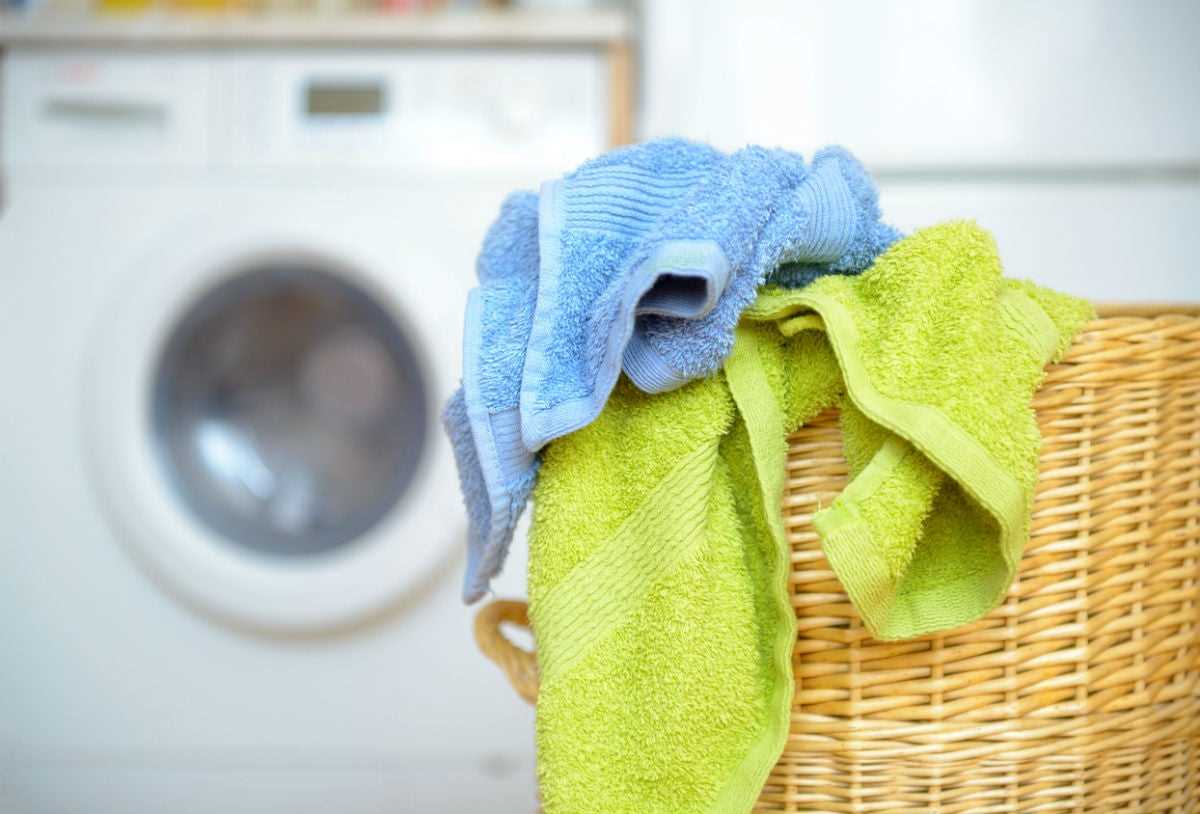
Properly washing your towels is essential for maintaining good hygiene. Towels are constantly exposed to moisture and can quickly become a breeding ground for bacteria, mold, and mildew. Regular washing helps remove these germs and keeps your towels fresh and clean. Improperly washed towels may result in skin irritations or infections.
2. Absorbency
Detergents, fabric softeners, and dryer sheets can leave residue on towels, which reduces their absorbency. It is crucial to choose a mild detergent and avoid using fabric softeners or dryer sheets. Additionally, proper washing techniques such as avoiding overloading the machine and using the right water temperature help maintain the towels’ absorbency.
3. Durability
Regularly washing towels not only keeps them clean but also helps extend their lifespan. Over time, dirt, oils, and residue can accumulate, causing the fabric to deteriorate. Washing your towels regularly and following proper care instructions, such as avoiding excessive heat in the dryer, helps preserve the towel’s fibers and prevents them from becoming worn, thin, or frayed.
4. Appearance
Clean, well-maintained towels enhance the overall appearance of your bathroom. Stained, discolored, or worn-out towels can make the room look less inviting. Properly washing and caring for towels helps prevent discoloration, removes stains, and keeps them looking fresh and vibrant.
5. Odor Prevention
Towels that are not properly washed can develop a musty or unpleasant odor. This odor is often caused by bacteria or mildew that has accumulated over time. Regularly washing and thoroughly drying your towels helps prevent this odor and keeps them smelling fresh.
In conclusion, properly washing and caring for your towels is essential for maintaining good hygiene, ensuring absorbency, extending their durability, enhancing their appearance, and preventing unpleasant odors. By following these simple tips and taking the time to properly wash and care for your towels, you can enjoy their benefits for a longer period of time.
Benefits of Proper Towel Care
- Enhanced Absorbency: Proper towel care, such as regular washing and drying, helps maintain the absorbency of the towels. Washing removes any buildup of oils, lotions, and other debris that can reduce absorbency over time. Drying the towels properly ensures they remain fluffy and able to absorb moisture effectively.
- Longer Lifespan: When towels are cared for correctly, they tend to last longer. Regular washing and drying techniques prevent the growth of mildew and bacteria, which can lead to unpleasant odors and deterioration of the fabric. By properly maintaining your towels, you can extend their lifespan and save money in the long run.
- Improved Softness: Proper care for your towels can help maintain their softness over time. Washing with appropriate detergent and avoiding the use of fabric softeners or dryer sheets can prevent residue buildup that can make the towels feel stiff or rough. Regularly fluffing and shaking out the towels after washing can also help maintain their soft texture.
- Prevention of Skin Issues: By properly washing and drying your towels, you can prevent the growth of bacteria, fungi, and other microorganisms that can cause skin irritation or infection. Fresh, clean towels reduce the risk of transferring harmful substances from the towel to your skin.
- Improved Appearance: When towels are properly cared for, they maintain their original color and appearance. Regular washing removes stains and dirt, keeping the towels looking clean and fresh. Avoiding the use of harsh detergents or bleach can help preserve the towel’s color and prevent fading.
- Enhanced Hygiene: Clean towels play a crucial role in maintaining personal hygiene. By following proper towel care practices, you can ensure that your towels are free from contaminants and safe to use on your body. This is especially important for towels used in bathrooms or for personal care purposes.
By taking the time to properly care for your towels, you can enjoy these benefits and ensure that your towels remain soft, absorbent, and hygienic for years to come.
How Often Should You Wash Your Towels?
Properly washing and caring for your towels is essential to maintain their cleanliness and longevity. One of the common questions people have is how often towels should be washed. The frequency of washing your towels depends on various factors, including their usage, level of dirtiness, and personal preference.
Personal Towels
Personal towels, such as bath towels and hand towels, should ideally be washed every three to four uses. This guideline ensures that you are using a fresh and hygienic towel that is free from bacteria and odors. However, if your towel becomes visibly dirty or starts to smell sooner, it’s best to wash it immediately.
Gym or Sports Towels
If you use towels at the gym or for sports activities, it’s important to wash them after each use. These towels often come into contact with sweat and bacteria, making them prone to odors and potential skin infections. Washing them after each use ensures that they are properly cleaned and ready for your next workout.
Kitchen Towels
Kitchen towels should be washed more frequently due to their exposure to food particles and potential contamination. It’s best to wash kitchen towels after every use to prevent the spread of bacteria and maintain a clean and sanitary kitchen environment.
Guest Towels
If you have guest towels in your bathroom, it’s a good practice to wash them after each use. This helps ensure that your guests always have fresh and clean towels during their stay.
Frequency of Washing
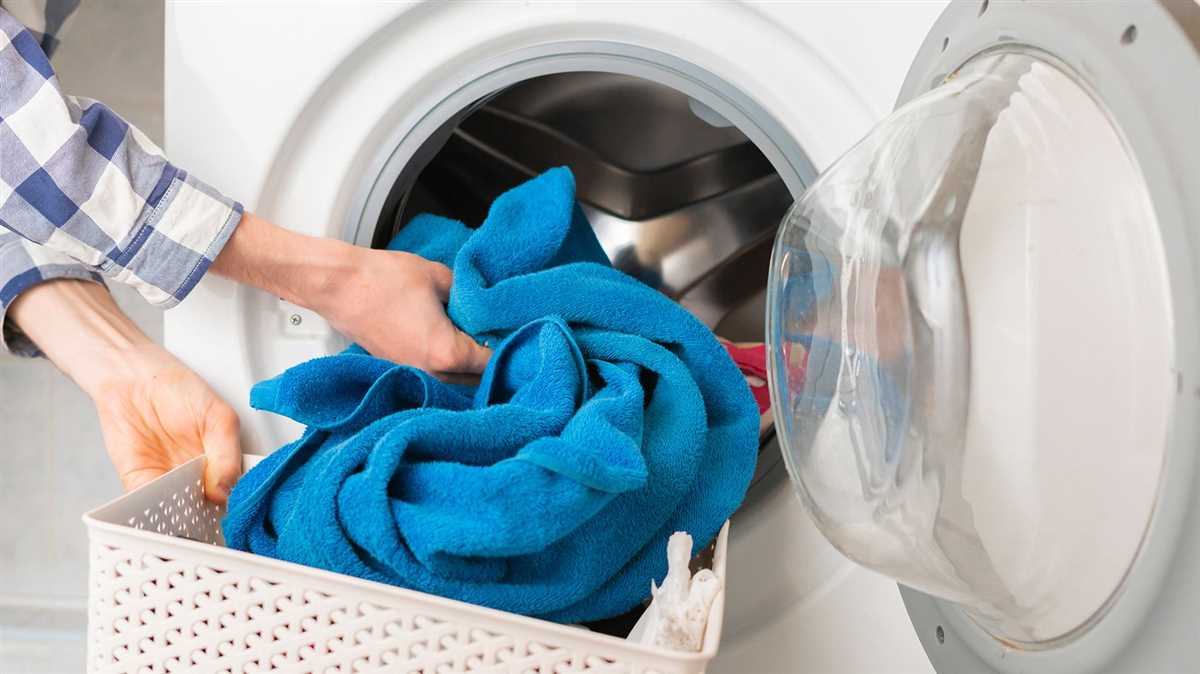
Regardless of the specific type of towel, it’s advisable to wash them at least once a week to maintain their cleanliness. If you have a larger household or frequently use towels, washing them more frequently can help prevent the buildup of bacteria and maintain their freshness.
Pro tip: Avoid using fabric softeners when washing your towels as they can reduce absorbency over time. Additionally, it’s best to wash towels separately from other types of laundry to prevent lint transfer and maintain their softness.
Summary
- Personal towels should be washed every three to four uses.
- Gym or sports towels should be washed after each use.
- Kitchen towels should be washed after every use.
- Guest towels should be washed after each use.
- At least once a week, all towels should be washed.
Following these guidelines will help ensure that your towels remain clean, fresh, and hygienic for everyday use.
Tips for Washing Your Towels
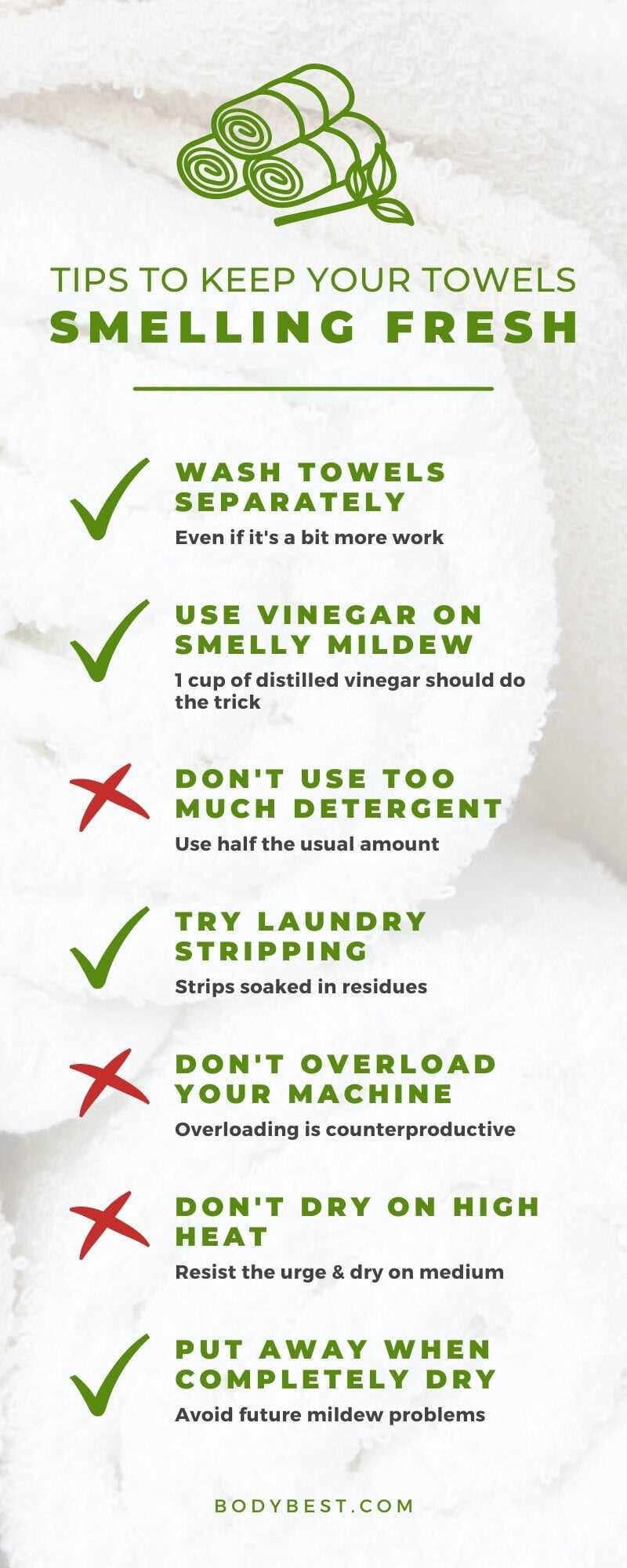
Properly washing your towels is essential to maintain their quality and hygiene. Here are some expert tips to help you wash your towels effectively:
1. Sort by Color
Separate your towels by color to avoid color bleeding. Wash dark-colored towels separately from light-colored ones.
2. Use the Right Temperature
Check the care label on your towels to determine the appropriate water temperature. Generally, towels can be washed in warm or hot water to help remove dirt and bacteria effectively.
3. Choose the Correct Detergent
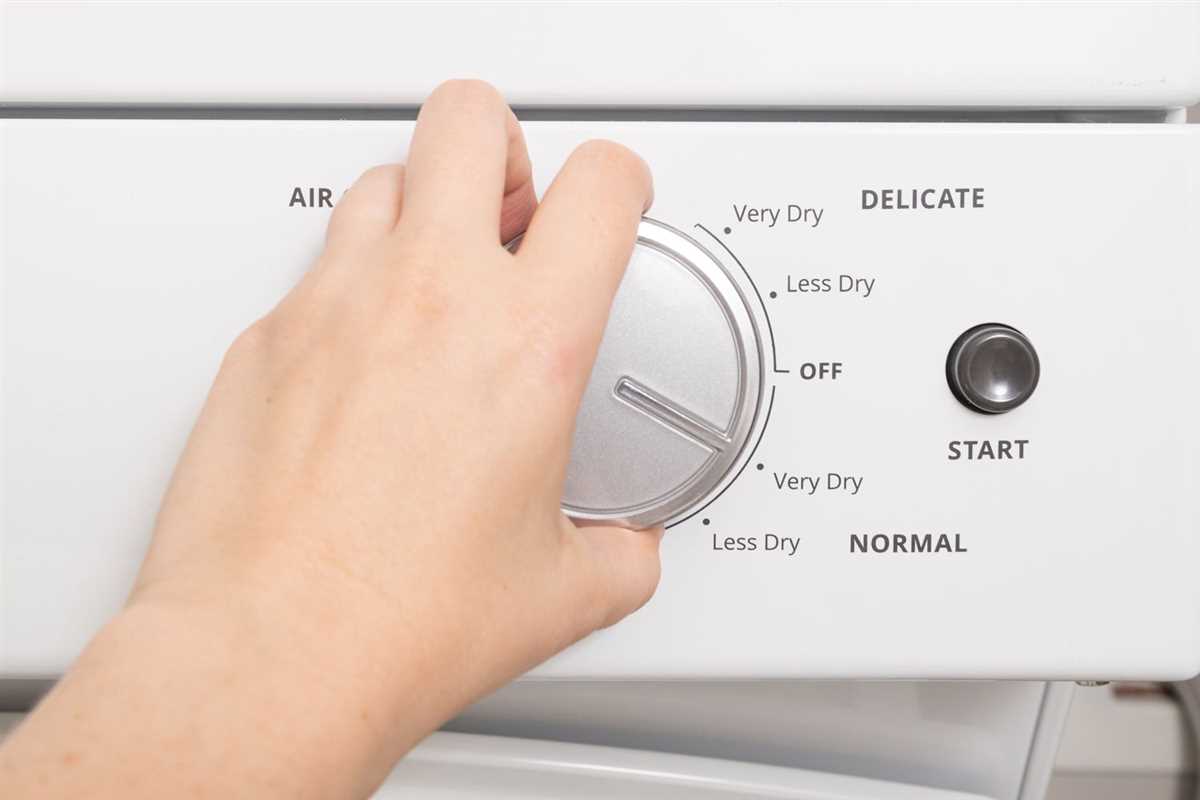
Use a mild detergent without any bleach or fabric softener. Bleach can damage the fibers of your towels, while fabric softeners can reduce their absorbency.
4. Don’t Overload the Washer
Ensure that you don’t overload your washing machine when washing towels. Overloading can prevent proper cleaning and rinsing, leading to musty odors or residue on your towels.
5. Avoid Using Too Much Detergent
Using too much detergent can leave residue on your towels, making them feel stiff and less absorbent. Follow the instructions on the detergent packaging for the recommended amount.
6. Choose the Right Wash Cycle
For regular cotton towels, a normal or heavy-duty cycle should be sufficient. However, if you have delicate or decorative towels, use a gentle cycle to prevent damage.
7. Avoid Fabric Softener
Fabric softeners can decrease the absorbency of your towels. Instead, add a cup of white vinegar during the rinse cycle to help remove any detergent residue and keep your towels soft.
8. Dry Thoroughly
Make sure your towels are completely dry before folding or storing them. Damp towels can develop a musty odor or even mold. Use a high heat setting in the dryer or hang them outside under the sun.
9. Wash Your Towels Separately
It’s a good idea to wash your towels separately from other laundry items, especially clothing items that may contain oils or lotions. This prevents the transfer of residues and helps maintain the cleanliness of your towels.
By following these tips, you can ensure that your towels remain soft, absorbent, and clean for a long time. Remember to always check the care label for specific instructions, as different towel materials may require slightly different washing methods.
Drying Your Towels the Right Way
Properly drying your towels is just as important as washing them. Incorrect drying techniques can leave your towels feeling stiff or smelling musty. Follow these expert tips to ensure your towels stay soft, fresh, and fluffy:
- Shake them out: Before hanging your towels to dry, give them a good shake to remove any excess water and help fluff up the fibers.
- Avoid direct sunlight: While it may be tempting to hang your towels outside in the sun, prolonged exposure to direct sunlight can fade the colors and weaken the fibers. Instead, choose a shaded area or indoor drying rack.
- Hang them properly: To prevent towels from stretching or losing their shape, hang them by their loops or use a clothespin to secure them in place.
- Space them out: Giving your towels enough space to air dry is crucial. Overcrowding them on a drying rack or hook can prevent proper airflow and lead to a damp, mildewy smell.
- Use a towel bar: If you have a towel bar, fold your towels in thirds lengthwise and drape them over the bar. This allows for maximum air circulation and helps maintain their shape.
- Rotate and flip: Flip your towels halfway through the drying process to ensure both sides dry evenly. If possible, rotate their positions on the rack to promote even drying.
- Opt for air drying: While using a dryer is convenient, air drying is gentler on towels and helps maintain their softness. If using a dryer, use the lowest heat setting and remove towels promptly to prevent over-drying.
- Avoid fabric softeners: Fabric softeners can leave a residue on towels, making them less absorbent. Opt for vinegar or baking soda instead to naturally soften your towels.
By following these drying tips, you can keep your towels in excellent condition and enjoy their softness and absorbency for years to come.
Expert Advice for Maintaining Soft and Absorbent Towels
Proper care and maintenance of your towels are essential for keeping them soft and absorbent. Here are some expert tips to help you maintain the quality of your towels:
1. Washing:
- Wash your towels separately from clothing items to avoid lint transfer.
- Use warm water and a mild detergent to prevent the towels from losing their softness.
- Avoid using fabric softeners as they can leave a residue on the towels, decreasing their absorbency.
- For extra softness, add a cup of white vinegar to the rinse cycle.
- Avoid overloading the washing machine to ensure proper cleaning and rinsing of the towels.
2. Drying:
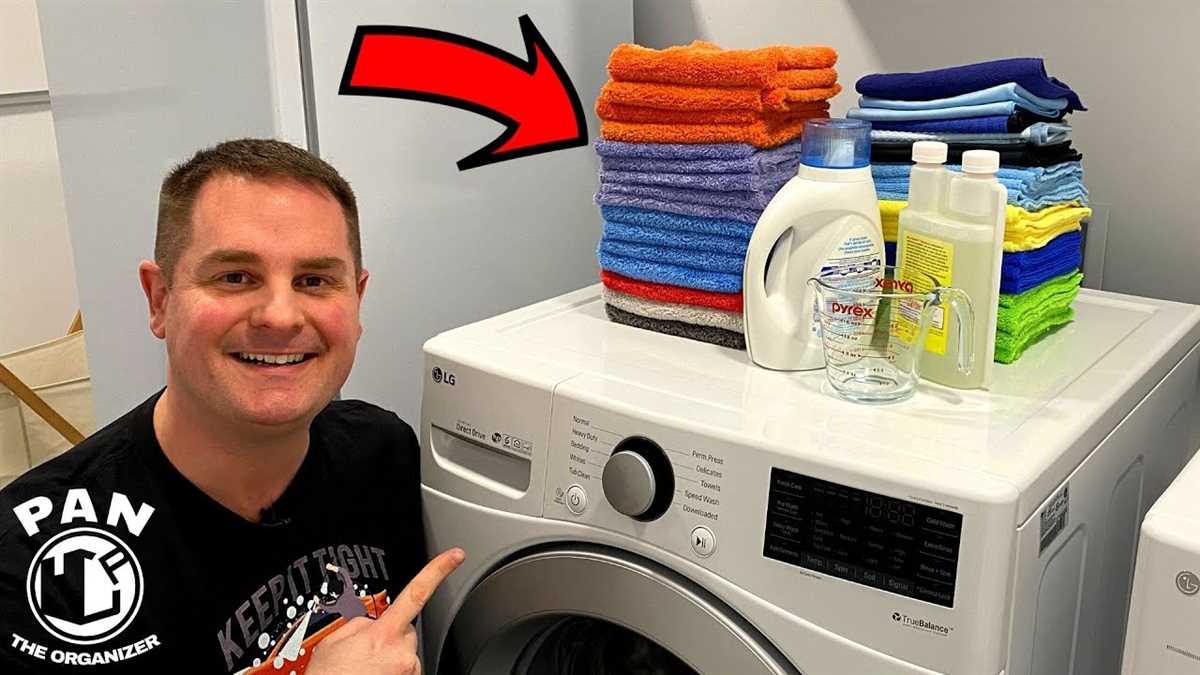
- Avoid over-drying your towels as it can lead to stiffness and reduce their absorbency.
- Hang your towels on a drying rack or line dry them in a well-ventilated area to preserve their softness.
- If you prefer using a dryer, use a low heat setting and remove the towels when they are slightly damp.
- Avoid using dryer sheets as they can leave a coating on the towels, making them less absorbent.
3. Storage:
- Make sure your towels are completely dry before storing them to prevent the growth of mold and mildew.
- Store your towels in a cool, dry place to maintain their freshness.
- Avoid storing towels in plastic bags as they can trap moisture and cause a musty smell.
- Consider rolling your towels instead of folding them to save space and reduce creasing.
- Rotate your towels regularly to ensure they wear evenly.
By following these expert tips, you can extend the lifespan of your towels and enjoy their softness and absorbency for a longer period of time.
FAQ
What is the best way to wash towels?
The best way to wash towels is to separate them by color and wash them in warm water with a mild detergent. Avoid using bleach or fabric softener as they can damage the fibers of the towel.
How often should I wash my towels?
Towels should be washed every three to four uses to keep them clean and hygienic. However, if you notice any foul odors or stains, it’s best to wash them immediately.
Can I wash towels with other clothes?
It’s best to wash towels separately from other clothes to prevent lint transfer. However, if you need to wash them together, make sure to use a delicate cycle and avoid washing towels with clothes that are prone to shedding.
Should I use fabric softener on my towels?
No, fabric softeners can reduce the absorbency of towels and leave a residue that can make them feel less soft. It’s best to avoid using fabric softener and instead opt for vinegar as a natural alternative for softening towels.
How should I dry my towels?
Towels should be dried in a well-ventilated area or tumble-dried on a low heat setting. Avoid over-drying them as this can make them stiff and less absorbent. If possible, hang them outside to dry in the sunlight, which can naturally freshen and disinfect the towels.
What is the best way to wash towels?
The best way to wash towels is to separate them by color and wash them in warm water with a gentle detergent. Avoid using fabric softeners as they can decrease the absorbency of the towels.
How often should I wash my towels?
You should wash your towels every 3-4 uses or once a week, whichever comes first. This will help prevent the buildup of bacteria and keep your towels smelling fresh.












